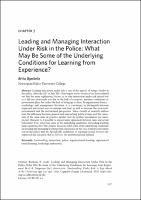Chapter 7 Leading and Managing Interaction Under Risk in the Police
What May Be Some of the Underlying Conditions for Learning from Experience?
Abstract
"Leading interaction under risk is one of the aspects of being a leader in
the police. After the 22nd of July 2011 Norwegian terror attacks it has been pointed
out that the main explanatory factors as to why interaction under risk turned out
as it did not necessarily was due to the lack of resources, previous evaluations or
government plans but rather the lack of living up to these. In organisation theory, -
psychology and management literature, it is customary to distinguish between
expressed and actual ways to manage and lead, as well as between the structuralinstrumental
and the institutional perspective. These strands of research address
how the difference between general and overarching political aims and the execution
of the same aims in practice neither may be neither uncommon nor unexpected.
However, is it possible to expect more agreement between aims and actual
behaviour? If so, what may some of the underlying conditions for leading learning
from experience be? This chapter discusses what some of the underlying conditions
for leading and managing learning from experience in the case of interaction under
risk in the police may be. Specifically, conditions of learning located between the
expressed and executed, that is, between the institutional and cultural."
Keywords
Samhandling; interaction; police; organizational learning; experienced; based learning; leadership; unforeseenDOI
10.23865/noasp.36.ch7OCN
1076782233Publisher website
https://www.cappelendamm.no/Publication date and place
Oslo, 2018Classification
Society and Social Sciences
Warfare and defence
Military and defence strategy


 Download
Download